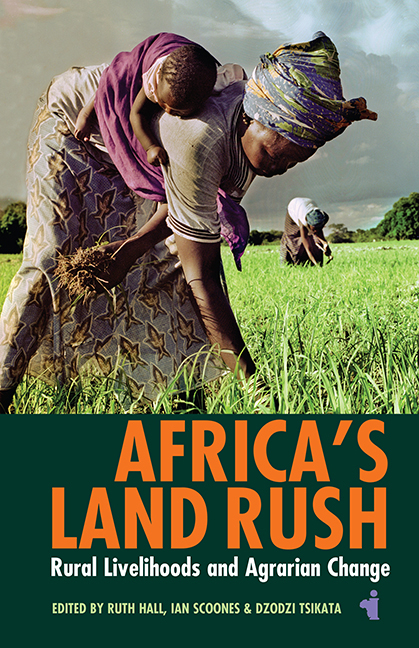Book contents
- Frontmatter
- Contents
- List of Maps, Tables & Figures
- Notes on Contributors
- Preface
- Acknowledgements
- List of Abbreviations
- 1 Introduction: The Contexts & Consequences of Africa’s Land Rush
- 2 State, Land & Agricultural Commercialisation in Kwara State, Nigeria
- 3 Recent Transnational Land Deals & the Local Agrarian Economy in Ghana
- 4 Large-Scale Land Acquisitions in Ethiopia: Implications for Agricultural Transformation & Livelihood Security
- 5 Land Deals & Pastoralist Livelihoods in Laikipia County, Kenya
- 6 Land Deals in the Tana Delta, Kenya
- 7 The State & Foreign Capital in Agricultural Commercialisation: The Case of Tanzania’s Kilombero Sugar Company
- 8 Trapped between the Farm Input Subsidy Programme & the Green Belt Initiative: Malawi’s Contemporary Agrarian Political Economy
- 9 Agrarian Struggles in Mozambique: Insights from Sugarcane Plantations
- 10 South African Commercial Farmers in the Congo
- References
- Index
4 - Large-Scale Land Acquisitions in Ethiopia: Implications for Agricultural Transformation &Livelihood Security
Published online by Cambridge University Press: 21 May 2021
- Frontmatter
- Contents
- List of Maps, Tables & Figures
- Notes on Contributors
- Preface
- Acknowledgements
- List of Abbreviations
- 1 Introduction: The Contexts & Consequences of Africa’s Land Rush
- 2 State, Land & Agricultural Commercialisation in Kwara State, Nigeria
- 3 Recent Transnational Land Deals & the Local Agrarian Economy in Ghana
- 4 Large-Scale Land Acquisitions in Ethiopia: Implications for Agricultural Transformation & Livelihood Security
- 5 Land Deals & Pastoralist Livelihoods in Laikipia County, Kenya
- 6 Land Deals in the Tana Delta, Kenya
- 7 The State & Foreign Capital in Agricultural Commercialisation: The Case of Tanzania’s Kilombero Sugar Company
- 8 Trapped between the Farm Input Subsidy Programme & the Green Belt Initiative: Malawi’s Contemporary Agrarian Political Economy
- 9 Agrarian Struggles in Mozambique: Insights from Sugarcane Plantations
- 10 South African Commercial Farmers in the Congo
- References
- Index
Summary
Introduction
Land, the state and politics are intimately interlinked in the political economy of Ethiopia and land has been central to the political debates between the ruling government and opposition political parties. Since 1992, more than 2.1 million hectares of land comprising nearly 4,700 separate projects have been leased to mainly foreign agricultural interests, with a peak of investment activity in the period from 2007. The amount of land transferred so far is much less than the target based on the government's estimates of ‘available land’. Yet the country has received a lot of media attention and criticism for the rush to transfer huge tracts of farmland to foreign and domestic capital.
This chapter explores the unfolding of two major land deals, both investments by the Indian company Karuturi Agro Products plc. Karuturi Agro Products plc is the Ethiopian operating name of the Bangalore-based cut-flower company owned by Sai Ramakrishna Karuturi. It operates in two Ethiopian states, Oromia and Gambela, and one case study from each is presented. See the map of the study area (Map 4.1).
The chapter is based on primary data collected through fieldwork conducted between March 2012 and May 2013. Data were collected through household and employee surveys, interviews with key informants, affected people and communities, group discussions and systematic observations. In addition, secondary data were collected from various government offices (at federal, regional and district levels) and from the large-scale farms to substantiate the primary data.
Political and policy narratives around land in Ethiopia
Commercial farming is not new to Ethiopia. It dates back to the Imperial era (1930–1974) when a few foreign companies, such as the Dutch sugar giant HVA, cultivated high value crops including sugarcane, cotton and sesame in the Awash valley (Zewde 2008; Rahmato 2009). A push to largescale farms existed in this period, guided by the ideology of transforming ‘traditional’ agrarian societies into ‘modern’ societies in the Western style (Abbink 2011).
The overthrow of Emperor Haile Selassie's government in 1974 by the Derg (a committee of the armed forces, police and territorial armies that opposed the emperor) resulted in changes to land and property relations between the state and the peasantry. The Derg regime (1974– 1991), guided by the socialist ideology of ‘redistribution with growth’, nationalised all privately owned farms from the Imperial period and transformed them into state farms.
- Type
- Chapter
- Information
- Africa's Land RushRural Livelihoods and Agrarian Change, pp. 65 - 82Publisher: Boydell & BrewerPrint publication year: 2015
- 1
- Cited by



